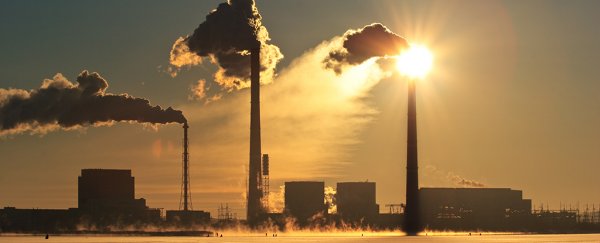We've passed the point of no return when it comes to stopping a rise of 1.5°C in global temperatures, a new study has found. That 1.5°C figure was a 'stretch goal' set down by the countries who signed up to the Paris agreement last December, but we've already well and truly missed the mark.
Now the race is on to limit the damage in rising temperatures to 2°C globally through a switch from fossil fuels to renewable energy sources, but the signs aren't looking great on that front either.
Researchers led by a team from the International Institute for Applied Systems Analysis ((IIASA) in Austria looked at the pledges submitted by the 195 countries who signed up to the Paris agreement in 2015, and calculated the level of global warming they're likely to lead to.
It looks like we're on course for a 2.6 to 3.1°C rise in temperature by the end of the century, they've concluded, if the reductions planned between now and 2030 are continued over the next 70 years.
The hopes of limiting temperature rise to 1.5°C by 2100 appear to have already disappeared, while the 2°C threshold is als under threat if countries don't promise to cut back on their carbon use even further.
"To go the rest of the way, we would need to assume much more stringent action after 2030, which leads to emissions reductions of about 3 to 4 percent per year globally," explained one of the team, Niklas Höhne from Wageningen University in the Netherlands.
"But in practice, switching to such stringent reductions right after 2030 would be challenging, and require time," he added. "[T]hat means that in order to ensure a chance of meeting these targets, we need significant further action from countries before 2030."
Let's hope the report acts as a warning call. As Gizmodo's Maddie Stone points out, a 3°C rise in temperatures would equal around a 6-metre (20-foot) rise in sea levels over several centuries, leaving hundreds of millions of people having to move home.
Low-lying nations were responsible for ensuring that the 1.5°C figure was included in the Paris agreement, but it looks like their hopes of hitting that target are now dashed. In fact, we might reach it as early as 2017, let alone keeping it at bay until 2100.
The Paris agreement does state that countries should improve their targets over time from 2020, but the new paper says these improvements are going to have to be "substantial" to avoid a rise of more than 2°C.
The team behind the study has also called on countries to be more specific about their emission targets in the coming years, finding that the range of uncertainties in the agreement as it stands adds up to approximately 6 billion tonnes of CO2 - that's the entire amount of carbon emitted by the US in 2012.
We need to take drastic action now - or face the consequences.
The findings have been published in Nature.
